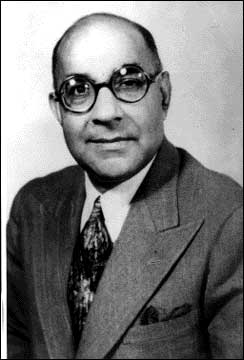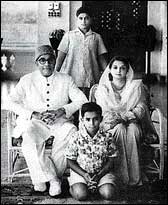![]()
Liaquat Ali Khan [1896-1951]

Nawabzada Liaquat Ali Khan, the second son of Nawab Rustam Ali Khan, was born on October 1, 1896 in a Madal Pathan (Nausherwan) family. After his graduation in 1918 from M.A.O. College, Aligarh, Liaquat Ali Khan was offered by the British Government to join the Indian Civil Services but he rejected the offer on the plea that he wanted to serve his nation. He was married to his cousin, Jehangira Begum in 1918. After his marriage, he went to London for higher education. In 1921, he obtained a degree in Law from Oxford and was called to Bar at Inner Temple in 1922. On his return from England in 1923 Liaquat decided to enter politics with the aim to liberate his homeland from foreign yoke. From the very beginning, he was determined to get rid of injustices and ill treatment meted out to the Indians by the British. In his early life, Liaquat Ali, like most of the Muslims leaders of his time, believed in Indian Nationalism but gradually his views changed. He was approached by the Congress leaders to join their party, but he refused and joined Muslim League in 1923. When Quaid-i-Azam, with the help of some other Muslim leaders, decided to put a new life in the Muslim League and held its annual session in May, 1924 at Lahore, Liaquat, like many other young Muslims, attended the session. Liaquat Ali started his parliamentary career from the U.P. Legislative Assembly in 1926 as an independent candidate. Later he formed his own party, The Democratic Party, in the Legislative Assembly and was elected its leader. He remained the member of the U.P. Legislative Council till 1940 when he was elected to the Central Legislative Assembly. In his parliamentary career, Liaquat Ali Khan established his reputation as an eloquent, un-purchasable, principled and honest spokesman who never compromised his principles even in front of severe odds. He always used his influence and good offices for the liquidation of communal tension and bitterness. He took active part in the legislative business. He was one of the members of the Muslim League delegation, which attended the National Convention held at Calcutta to discuss the Nehru Report, in December 1928.
Liaquat Ali second marriage was with Begum Raana took place in 1933.Begum Raana was a distinguished economist and an educationalist who stood through the thick and thin of Liaquat Ali’s political life career .She proved to be a valuable asset to his political career as well as his private life. Quaid-i-Azam in those days was in England in self-exile. The Newly wed couple had a number of meetings with the Quaid and convinced him to come back to India to take the leadership of the Muslims of the region. When Quaid-i-Azam, on his return to India, started reorganizing Muslim League, Liaquat was elected as the Honorary Sectary of the party on April 26, 1936. He held the office till the establishment of Pakistan in 1947. In 1940, he was made the deputy leader of the Muslim League Parliamentary party. Quaid-i-Azam was not able to take active part in the proceedings of the Assembly on account of his heavy political work thus the whole burden of protecting Muslim interests in the Assembly fell on Liaquat’s shoulders. Liaquat was also the member of Muslim Masses Civil Defense Committee, which was formed to keep the Muslims away from the Congress activities and to strengthen the League’s mission.

Liaquat Ali Khan with his family
Liaquat won the Central Legislature election in 1945-46 from the Meerut Constituency in U.P. He was also elected Chairman of League''s Central Parliamentary Board. He assisted Quaid-i-Azam in his negotiations with the members of the Cabinet Mission and the leaders of the Congress during the final phase of freedom movement. When the Government asked Muslim League to send their nominees for representation in the Interim Government, Liaquat was asked to lead the League group in the cabinet. He was given the portfolio of finance, which he handled brilliantly. He influenced the working of all the departments of the Government and presented a poor man’s budget. His policies as Finance Minister helped in convincing the Congress to accept the Muslim demand of a separate homeland.